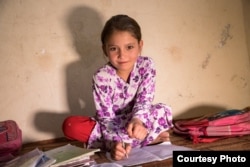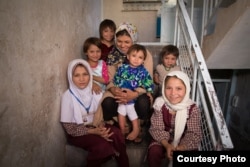The hardships and anguish of Three years of Taliban rule are reflected in the bright brown eyes of schoolgirl Parwana Malik. And on the anniversary of the US withdrawal from Afghanistan, advocates say Washington should take a closer look at the plight of countless girls who have suffered under the hardline regime.
In 2021, When the last American troops were leaving After two decades in the country, Malik’s father sold her in marriage to a much older man.
She was 9 years old, a young age even by local standards, when many Afghan girls are married off as teenagers.
In 2021, the United Nations Children’s Fund sounded the alarm about a dramatic increase in child marriage as Western forces and aid organizations withdrew, and desperate Afghan families lost the safety net those groups provided. Some engagements, they said, involved girls as young as 20 days old.
And local media have reported that girls as young as 7 have been forced to marry Taliban commanders.
“What the Taliban are doing to women and girls is absolutely a crime against humanity,” said Stephanie Sinclair, a photographer and founder of the nonprofit group Too Young to Wed. “And Afghan girls and women inside the country are really suffering, unlike anywhere else in the world.”
Earlier this month, at an event to mark the anniversary, a Taliban official gave a defiant speech criticizing foreign interference.
The new leadership “eliminated internal differences and expanded the scope of unity and cooperation in the country,” said Deputy Prime Minister Maulvi Abdul Kabir. “No one will be allowed to interfere in internal affairs, and Afghan soil will not be used against any country.”
Neither he nor the three other speakers at the event spoke about the everyday struggles of civilians. Women, including journalists, were barred from the event. And this month, the regime passed a law restricting women’s movements and requiring them to cover their bodies and silence their voices in public.
The UN human rights body condemned the law as “atrocious” and demanded its repeal.
“The recently adopted law on the promotion of virtue and prevention of vice by the de facto authorities in Afghanistan entrenches policies that completely erase women’s presence in public, silencing their voices and depriving them of their individual autonomy, effectively attempting to turn them into faceless and voiceless shadows,” said Ravina Shamdasani, spokesperson for the Office of the United Nations High Commissioner for Human Rights.
The Taliban are not officially recognized as Afghanistan’s leaders by the UN or most countries. However, the regime has been slowly gaining recognition. China this year became the first country to accept credentials from a Taliban-appointed ambassador. And Russia’s foreign minister recently called the Taliban “the real power” in the country.
“We never moved our embassy from there, and neither did the People’s Republic of China,” said Russian Foreign Minister Sergey Lavrov. “The Afghan ambassador presented his credentials to Chinese President Xi Jinping in Beijing along with other ambassadors. Kazakhstan recently decided to remove them from the list of terrorist organizations. We are planning to do the same.”
Washington has refused to recognize the Taliban as the legitimate government and has kept its distance, although the White House has repeatedly said it maintains influence over the group and has “on the horizon” capabilities to strike.
US President Joe Biden did not mention the Taliban in his statement this week marking the anniversary of the chaotic US withdrawal. He likes to describe Afghanistan as “the graveyard of empires,” so named for the stubborn resistance to foreign influence by its revered protectors.
Near the top of that ladder is the late resistance fighter Ahmad Shah Massoud, nicknamed the “Lion of Panjshir.” The anti-Soviet guerrilla leader, killed by Taliban sympathizers in 2001, is commemorated everywhere in the verdant valley of that name. Panjshir was the last of the country’s 34 provinces to fall in 2021.
From exile, Massoud’s eldest son now leads the nation’s resistance movement. This week, Ahmad Massoud, head of Afghanistan’s National Resistance Front, argued that trampling on the human rights of half the population is not just bad politics, but bad policy.
“They do not represent the will of the people,” he said. “Young people in Afghanistan, especially girls, have dreams and aspirations no different from their peers around the world.”
Vice President Kamala Harris also issued her own statement on the anniversary of the U.S. withdrawal. Like Biden, she made no mention of the regime’s abysmal treatment of girls and women, though her campaign for her nation’s top post is a strong repudiation of the Taliban’s rule that girls cannot be sent to school beyond the sixth grade.
Republican presidential hopeful Donald Trump also focused on the Death of 13 US soldiers criticizing the Biden administration’s withdrawal.
“Caused by Kamala Harris, Joe Biden, the humiliation in Afghanistan triggered the collapse of American credibility and respect around the world,” he said. “And the fake news doesn’t want to talk about it.”
Sinclair urged American leaders to focus not on the men in charge, but on the female voices they have silenced — and to impose harsher consequences for it.
“I saw those statements, and I really think that we really need to put more responsibility, do more accountability, on the Taliban in how they address their crimes,” he said.
She and other advocates are urging foreign powers to squeeze the regime even further.
“Otherwise, we’re inching closer to normalization,” he said. “The next thing we’re going to hear is that elementary school girls are going to be out of school. … It’s only going to get worse. It’s become clear that this is not Taliban 2.0. This is the original hardline stance they had in the late 1990s. And we really need to do better.”
And now, in the midst of these gloomy discussions: a plot twist.
Too Young to Wed persuaded Parwana’s elderly husband to return her to her family. Her story inspired the group to launch a fund in her name, which is now feeds around 1,000 Afghan families per month and provides essential supplies such as blankets and baby supplies.
And Parwana is now back where she belongs, Sinclair says: at school.
“She’s quite a character,” Sinclair said. “She has a lot of big opinions, and she wants to be a teacher or a doctor, and she wants to do something, and she has the power to do it. … The problem is that she’s not living in a society that allows that under this regime, and unfortunately, there are millions of Parwanas right now.”
And as Parwana approaches sixth grade, where most girls worry not about their husbands but about schoolwork, friends and the gale-force winds of puberty, she carries a heavy burden on her young shoulders: the knowledge that unless something changes, her education will soon end.
But in the few years she has left, with her wide smile and deep brown eyes shining with hope and joy, she holds on to something else close to her chest: her school books.
[Con información de The Associated Press]
Connect with the Voice of America! Subscribe to our channels YouTube, WhatsApp and the newsletter. Activate notifications and follow us on Facebook, X and Instagram.

















Add Comment